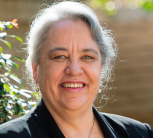28 August 2015 by Myan Subrayan
Ms Melanie Moen, a lecturer in the Department of Early Childhood Education and PhD student in the Faculty of Education at the University of Pretoria (UP), presented a part of her doctorate research, namely an in-depth analysis of children who commit family member murder, at an international conference on psychology and law held in Nuremberg, Germany. The conference, which took place from 4–7 August, was organised by the European Association of Psychology and Law (EAPL) in celebration of its 25th anniversary.
The event attracted researchers, practitioners and policy makers from all over the world and Ms Moen’s presentation elicited great interest. In her introduction she shared some shocking statistics from South Africa:
She also cited an actual case of a 15-year-old girl who had murdered her parents and sister. ‘This crime and similar cases grab our attention and cause us to question family structures and modern day society. Family murder is however not a new phenomenon. Consider the Biblical account of Cain and Abel,’ she said.
She explained that empirical research on violence-related crimes related specifically to children is limited and that murder is seen by many as the most serious of all crimes. It has a serious human and social impact on society and puts pressure on mental health institutions and the criminal justice system.
She hopes her research will help change this situation by providing the knowledge to assist in understanding, predicting and preventing violent behaviour in children and young people. She also aims to provide insight that could inform policy, theory and practice.
The main purpose of Ms Moen’s study is to explore, interpret and understand the unique life worlds of children who commit family member murder and ultimately to contribute to the body of knowledge about children who commit violent crimes. During her on-going research, she will consider the following questions:
Ms Moen is planning a qualitative research study of 12 to 15 subjects who were convicted of family member murder while under the age of 25. She will most likely conduct her research in prisons and non-custodial correctional facilities throughout South Africa. As some of the subjects did not receive custodial sentences, they will have to be contacted through lawyers and social workers.
Ms Moen will be working under the supervision of Prof Irma Eloff, Dean of the Faculty of Education at UP, and Prof Christiaan Bezuidenhout of the Department of Social Work and Criminology at UP.
Ms Melanie Moen, Prof Irma Eloff, Prof Christiaan Bezuidenhout
August 28, 2015

Prof Christiaan Bezuidenhout completed his undergraduate studies at the University of Pretoria (UP) and has been teaching full-time at the institution for the past 30 years. He says that as one of the best-known universities in Africa, UP has collaboration agreements with many global tertiary institutions, and that its contributions to the betterment of humanity makes it a global research institution. “Research is important, and as a lecturer who also does research, I can confirm that research feeds teaching and vice versa,” he says.
Prof Bezuidenhout says he is a researcher, teacher, scholar and advocate of the criminology discipline. “Criminology is the only science that encompasses itself with the crime phenomenon in its relativity.”
He is involved in three fields of research specialisation: criminal justice (policing), psychocriminology and juvenile. In terms of his work in the criminal justice field, he is a Fulbright scholar who is investigating the role and performance of female law enforcement (LE) officers in a traditional male working domain, in the Department of Criminal Justice at East Carolina University in the US. He was elected as a principal candidate for the Fulbright South African Research Scholar Programme for the 2021–2022 academic year and the research tenure is from August 2021 to April 2022.
Women still make up a noticeable minority in most LE departments around the world, Prof Bezuidenhout explains. Strategies to address this include targeted recruitment, proactive affirmative action measures, change in broader government policies and the discretionary interpretation of progressive LE leaders. Within the male-dominated world of LE, female officers from all race groups, as well as those from the LGBTQIA+ community, face many barriers and obstacles, such as disregard, discrimination, under-representation and stigma.
Although many gender mainstreaming initiatives have been implemented, women in policing are still under-represented, he adds. Attrition, rank and specialisation still seem to be gendered. Among younger recruits, there remains many who believe that males and females are suited to different tasks in LE. “Gender washing” initiatives are often used as window dressing and come in different forms: selective disclosure, dubious labelling and empty gender policies.
Prof Bezuidenhout’s research is in line with the United Nations’ Sustainable Development Goals (No 16) to promote peaceful and inclusive societies for sustainable development, provide access to justice for all, and build effective, accountable and inclusive institutions at all levels. It is also in line with UP’s faculty and departmental key research areas.
He regards this research project as a highlight, and intends to write about his findings in peer-reviewed journals and international peer-reviewed books, and present them at conferences.
In the psychocriminology field, Prof Bezuidenhout combines two disciplines – criminology and abnormal psychology – to explain atypical behaviours that occur in the South African context. In this field of expertise, he researches and writes about macabre criminal events in society: why people commit serial rapes or serial murders; what motivates children to murder their parents; and the link between personality as well as mental disorders and crime.
In the juvenile delinquency field, he has authored textbooks and launched community engagement projects. Many youth misbehaviour incidents occur because of immediate societal factors in a young person’s life, he asserts. These challenges and processes are addressed in the book Child and Youth Misbehaviour in South Africa: A Holistic Approach (2018), which Prof Bezuidenhout edited. The publication offers a look at all the factors (environmental, social, psychological and physiological) that influence youths to commit serious offences. The criminal justice system’s interaction with young offenders is also examined.
Along with an American colleague, Prof Bezuidenhout is also working on a cross-cultural study entitled ‘A comparative analysis of human trafficking between the USA and South Africa’, which focuses on legal and policing dilemmas. This was a quantitative study, and the first section has been completed. Prof Bezuidenhout was the principal researcher in South Africa.
At UP, he is involved in an envisaged research project with Dr Melanie Moen of the Department of Early Childhood Education that focuses on violence against children. Prof Bezuidenhout is the co-applicant and researcher for a grant from the Sexual Violence Research Initiative in the Knowledge for Action to End Violence Against Women and Violence Against Children Research Grant Programme. If the application is successful, a multidisciplinary team will undertake research entitled ‘Compassionate care to alleviate violence in children’ from April 2022.
South Africa is regarded as a “risk society” and one of the most violent countries in the world. Children exposed to violence and adversity are at high risk of developing psychiatric disorders. Yet there is a dearth in South African research and literature that relates to the differential risks children face, as well as in the documented perspectives, experiences and responses of children within diverse structural contexts.
If approved, the project will be a collaboration between researchers, the corporate sector, an NGO and schools in South Africa, and the Zero Abuse Project in the US. It will be an interdisciplinary study that takes place over two years, involving investigators in psychology, criminology, education and the social sciences.
Prof Aubrey Theron, former head of the Department of Criminology, inspired Prof Bezuidenhout’s research career. “As a young man, I wanted to become a game ranger or something practical, but Prof Theron said he believed that I had the potential to be an academic. He always had an open door for students and assisted with academic challenges. Eventually I got enmeshed in teaching and research, and the rest is history.” Prof Theron inspired him to use the stumbling blocks in his life as stepping stones, he adds. “His patience in difficult situations rubbed off on me and stood me in good stead in academically tough times and in my personal life.”
His mother was another source of inspiration for Prof Bezuidenhout. He describes her as “a hard-working, humble human being” and believes that those qualities have characterised his research career.
Prof Bezuidenhout hopes that his research will make a difference and address societal issues that are regarded as troublesome or problematic. He aims to contribute to the body of criminology knowledge by sharing his findings to improve our understanding of the world.
His research matters because his work looks at the underdog, or the minority, or the individual or group in strife, he says. “With good quality ethical research, one can address these issues and with informed opinions, one can make a difference,” he adds. “If you do not know something about anything – do research to know everything about something! To learners and students who would like to know why people commit crime, how society reacts to it, how crime is investigated, what the impact of crime is on the victim and society, as well as what is done to attempt rehabilitation of criminals, criminology is the discipline for you.”
Prof Bezuidenhout loves going to the Bushveld in winter, and enjoys its early morning sounds and smells with a cup of coffee in hand. He listens to music that feeds his soul and likes playing golf, but rarely gets the opportunity to play. “I am a petrol head at heart, but I cannot enjoy this passion wholeheartedly due to my number one commitment – my family.”

Professor Irma Eloff is a registered educational psychologist and a Professor of Educational Psychology at the University of Pretoria (UP).
She is an alumna of the Universities of Pretoria, Stellenbosch and North-West, and of UP’s Gordon Institute of Business Science. During her undergraduate years, she read Psychology and English at North-West University; she completed her postgraduate studies at UP and her doctorate at Stellenbosch University.
Prof Eloff has been doing research at UP for three decades. Her first appointment at the University was in 1991 as a teaching assistant in Education, followed by a year as research assistant to the Dean while doing her master’s degree in Educational Psychology (then called Orthopedagogics). She also served two terms as Dean of Education at UP.
Prof Eloff says UP is a world leader in the social sciences, which is why she is doing research at the University. “Some of the best minds in education and psychology have walked the UP hallways over the past 50 years,” she says. “UP’s research environment is vibrant, dynamic, diverse, self-critical and future-focused.” She adds that she appreciates UP’s strong push for interdisciplinary knowledge development and the alignment with global agendas for sustainable development.
Her research is primarily within the field of sustainability as it pertains to health and well-being – Sustainable Development Goal (SDG) 3 – and quality education (SDG 4). Agenda 2030 provides a roadmap to create peace and prosperity for people and the planet, and Prof Eloff is happy to align her research to this global agenda.
She leads a team of researchers from Austria and Africa that is exploring the role of teachers in supporting the SDGs. The Teach4Reach project brings together global scholars, researchers, teacher educators, teachers, policymakers and civil society organisations to support Agenda 2030.
In addition, Prof Eloff is involved in exploring increased synergies between education, psychology and malaria research in the Faculty of Health Sciences.
She is a member of the Academy of Science of South Africa, a founding member of the South African Positive Psychology Association, and Chair of the Global Network of Deans of Education. Prof Eloff also founded the African Deans of Education Forum, which is a focal point of the UNESCO International Teacher Task Force.
Prof Eloff has held visiting professorships at the Cape Peninsula University of Technology in Wellington and Rhodes University; Yale University, Fordham University and the University of Wisconsin-Milwaukee in the US; and at Bath Spa University in the UK. In 2018, the University of Innsbruck awarded her the Förderkreis 1669 Wissenschafft Gesellschaft professorship.
She has authored more than 80 scholarly articles and book chapters, and has edited six books. The Handbook of Quality of Life in African Societies, which she edited, was recently published by Springer publications. This volume brought together interdisciplinary research in the critical field of quality of life. It spans contributions from education, psychology, economics and health sciences to food and nutrition, technology and family studies.
Prof Eloff says that she has always been drawn to working with vulnerable populations. In her early doctoral work, she worked with children with disabilities, among others, then with mothers and children affected by HIV/AIDS, and is now involved with well-being research in a variety of groups. “There is much to be learnt from the ways in which human beings deal with adversity, and even more work to be done in terms of creating a world in which everyone has the opportunity to flourish.”
Prof Eloff adds that she takes inspiration from many people in academia: her peers, predecessors, students and especially the next generation of young researchers.
She regards the role of psychology within the domain of education as more important now than at any other point in history. “Multivariate and systemic well-being are integral to optimal learning at all levels of development,” she says. “The research we do on health, well-being and quality of life provides unique insights from the African context – that is why my research matters.”
She advises school learners or undergraduates interested in her field to follow their interests “and to follow the opportunities that arise”.
In her spare time, Prof Eloff enjoys spending time with friends and family, taking pictures and being creative.
 Story
Story
The latest issue of the University of Pretoria’s award-winning RE.SEARCH magazine is available now and reflects a shift towards both a fresher design and outlook. This edition is curated under the theme ‘Digital’, and offers a glimpse into some of the fascinating research we’re doing at UP to drive digital leadership and innovation.
 Story
Story
The articles in this edition showcase work from all nine of our faculties, and underscore our University’s slogan ‘Make today matter’. RE.SEARCH has been named South Africa's top corporate publication as the winner of the 2024 SA Publication's Forum Awards. It is a runner up and finalist in the Excellence category for Communication (runner up), Design and Photography (finalist) and the...
 Story
Story
RE.SEARCH 9 is our most novel edition yet. In it, we have featured research that encourages us to think afresh, and is doing so, we’ve highlighted new ways of looking at research. You can expect to read about research that has potential and promise for the future but which is still nascent or represents an educated guess. This edition also features a range of multimedia that you can immerse...
Copyright © University of Pretoria 2025. All rights reserved.
Get Social With Us
Download the UP Mobile App